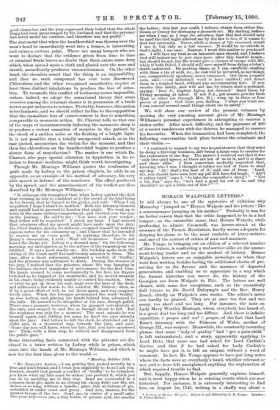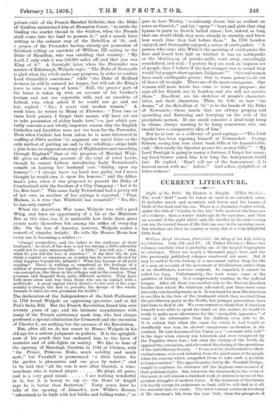HORACE WALPOLE'S LETTERS.*
IT will always be one of the mysteries of criticism why Macaulay "jumped on" Horace Walpole and his letters " like a costermonger jumping on his mother." Probably it was for no better reason than that the critic happened to be in a bad temper ; as the ostensible cause, that Horace Walpole, while professing to admire Cromwell, was horror-struck at the excesses of the French Revolution, hardly seems adequate for -denying his claim to be the most readable of letter-writers, and one of the acutest of critics of men and manners.
Mr. Yonge, in bringing out an edition of a selected number of these letters, is conferring a real service alike on the amuse- ment-loving reader and on the student of history. Horace Walpole's letters are as enjoyable nowadays as when they were first written, besides having the additional charm of pre- serving for us the flavour and the manners of departed generations, and enabling us to appreciate in a way which the formal historian can never do, the history of the Georgian era from Walpole to Pitt. The letters are well chosen, with some few exceptions, such -as the excessively dull letters to Sir David Dalrymple and the Rev. Henry Zouch, chiefly on Walpole's own works. The editor's notes can hardly be praised. They are at once too few and too many, too short and too long. For instance, the note, on Lady Mary Wortley Montagu, whom everybody has heard of, is a great deal too long and too diffuse. And there is infinite repetition, a propos and ma/ a propos, of the fact that Lord Bute's intimacy with the Princess of Wales, mother of George III., was suspect. Meanwhile, the constantly recurring phrase that some " lady of quality" had "got a pain-child" is left untranslated ; and a story, apparently applying to Lord Bate, that some one had asked for Lord Carlisle's Garter, and that if he had asked for Lady Carlisle's he might have got it, is left an enigma without a word of comment. In fact, Mr. Yonge appears to have put long notes where the facts were at everybody's hand, whether relevant or not, and to have left unexplained anything the explanation of which required trouble to find.
But, happily, Horace Walpole generally explains himself, and is most happy when he is relating events which are now historical. For instance, it is extremely interesting to find him, on August 1st, 1745, writing in a chaffy way about a
• Letters of Horace Walpole. Selected and Edited by 0. D. 'Kopp. London : T. Fisher Unwin. privater,visit. of the French Marshal Belleisle, that the Duke of Grafton entertained, him at Hampton Court, "to settle the binding -the scarlet thread in the window; when the French shall come -into the land to possess it ;" and a month later writing in the calmest way of the Rebellion of '45, and, apropos of the Pretender having already got possession of Scotland, telling an anecdote of William III. saying to the Duke of Hamilton, who was extolling that country : "My Lord,- I only wish it- was 100,000-miles off,- and that you was King of it." A fortnight later, when the Pretender was master of Edinburgh, Walpole says : "The Duke of Newcastle is glad when the rebels make any progress, in order to confute Lord Granville's assertions ;" while "the Duke of Bedford declares he will be amused no longer, but will ask the King's leave to raise a troop of horse." Still, the greater part of the letter is taken up with an account of his brother's foreign and not too reputable wife, and an anecdote of Lebeuf, who, when asked if he would not go and see her, replied.: " No ; I never visit modest women." A week later, he writes to Mann at Florence : "Your- two or three Irish priests, I forget their names, will have set out to take possession of abbey lands here,"—a jest which pro- bably conceals a not wholly impotent reason why the English Catholics and Jacobites were not too keen for the Pretender. Even when Carlisle has been taken, he is more interested in scoffing at Pitt's motion "to augment our naval force as the only- method of putting an end to the rebellion,—ships built a year hence to suppress an army of Highlanders now marching through England," than at the progress of Marshal Wade. He gives an affecting account of the trial of rebel Lords, though he cannot forbear introducing Lady Townshend's remark on hearing her husband vote "Guilty, upon my honour,"—" I always knew my Lord was guilty, but I never thought he would own it upon his honour ;" and the Alder- man's joke, when it was proposed to present the Duke of Cumberland with the freedom of a City Company : "Let it be the Butchers'." This same Lady Townshend had a pretty wit of her own, as another of her sayings is reported.: "Pray, Madam, is it true that Whitfield has recanted?" "No, Sir; he has only canted."
When the American War came, Walpole was still a good Whig, and loses no opportunity of a hit at the Ministers.
But at this time, too, it is noticeable how little these great events make themselves felt among the trifles of every-day life. On the loss of America, however, Walpole makes a remark of singular insight. He tells Sir Horace Mann how every one is becoming a soldier :— " Camps everywhere, and the ladies in the uniforms of their husbands ! In short, if the dose is not too strong, a little adversity would not be quite unreasonable. A little !' you will cry ; why, what do you call the loss of America ? ' 0 my dear Sir, do you think a capital so enormous as London has its nerves affected by what happens beyond the Atlantic ? What has become of all your reading ? There - is nothing so unnatural as the feelings of a million of persons who live together in one city. They have not one conception, like those in the villages and in the country. They presume and despond from quite different motives. They have both more sense and less than those who are in contact with a multitude. A great capital which dictates to the rest of the com- munity is always the last to perceive the decays of the whole, because it takes its own greatness for health."
The declaration of the Independence of the Irish Parliament in 1784 found Walpole an approving spectator, and so did Fox's India Bill. But the French Revolution found him over seventy years of age; and his intimate acquaintance with many of the French aristocracy made him, who had always professed a special admiration for Cromwell and the execution of Charles I., see nothing but the excesses of the Revolutions But, after all, we do not resort to Horace Walpole in his old age for a serious judgment on politics. It is the sprightli- ness of his youth that has endeared him to the lover of memoirs and of side-lights on society. We like to hear of the opening of Ranelagh Gardens in 1742 at Chelsea, with "the Prince, Princess, Duke, much nobility and much mob;" but Vauxhall is pronounced "a little better, for the garden is pleasanter, and one goes by water;" and to be told that "all the run is now after Garrick, a wine- merchant who is turned player He plays all parts, and is a very good mimic I see nothing wonderful in it, but it is heresy to say SO: the Duke of Argyll says• he is better than Betterton." Forty years later he tells of the opening of Almack's, now Willis's Rooms, "advertised to be built with hot bricks and boiling water ;" or goes to hear Wesley, "wondrously clever, but as evident an- actor as Garrick ;" and his " opera " "boys and girls that sing hymns in parts to Scotch ballad tunes ; but., indeed, so long that one would think they were already in eternity, and knew how much time they had before them." In 1750 London enjoyed, and thoroughly enjoyed, a series of earthquakes. "A parson who came into White's the morning of earthquake the first and heard beta laid on whether it was an earthquake or the blowing-up of powder-mills, went away exceedingly scandalised, and said : I protest they are such an impious set of people, that I believe if the last trumpet was to sound they would bet puppet-show against Judgment." "Several women have made earthquake gowns : that is, warm gowns to sit out of doors all to-night. These are of the more courageous. One woman still more heroic has come to town on purpose : she says all her friends are in London, and she will not survive them." Excellent are his sketches of people's character- istics, not their characters. Thus, he tells us how "the drama" of the Rebellion of '45 "is in the hands of the Duke of Newcastle,—those hands that are always groping and sprawling and fluttering and hurrying on the rest of his precipitate person. If one could conceive a dead body hung in chains, always wanting to be hung somewhere else, one should have a comparative idea of him."
But he is best as a collector of good sayings :—" The Irish Speaker has been reposing himself at Newmarket. George Selwyn, seeing him toss about bank-bills at the hazard-table, said : 'How easily the Speaker passes the money-bills." "My Lord Denbigh is going to marry a fortune, I forget her name ; my Lord Gower asked him how long the honeymoon would last. He replied : Don't tell me of the honeymoon : it is harvest-moon with me.' Adieu!" And adieu, sprightliest of letter-writers !



































 Previous page
Previous page